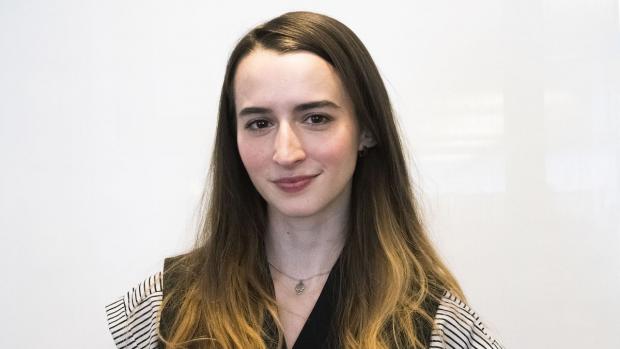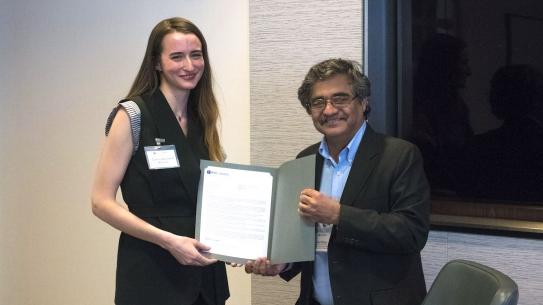Meet Caitlin Quintero Weaver
Modern-Day Renaissance Woman and NYU Tandon’s First Cyber Fellow

Caitlin Quintero Weaver built a rudimentary website when she was 11 years old, and a few years later she developed her first money-making tech project: a video game featuring a popsicle-collecting cat that she put on floppy disks and sold for $5 each to her classmates.
Her mother (an author and artist) and father (a mechanical engineer) were decidedly unhappy when Weaver, bored by high school, dropped out in 10th grade to earn her GED. Later, however, she entered the University of Alabama, where, thanks to a progressive interdisciplinary program, she designed her own curriculum in cognitive linguistics and studied French and Russian. She came by her interest in languages naturally: her maternal grandfather, who had emigrated from Argentina to the American South in the early 1960s, was an amateur linguist. (A Baptist minister by profession, he owned an enormous collection of Bibles in various languages, many of which he was able to teach himself, thanks to his deep knowledge of the source material.)
Weaver thus seemed on track for a comfortable post as a university linguistics professor, but when she realized that the realities of the academic job market made that an uncertain proposition, her thoughts returned to the tech world. She subsequently came to NYU to study in the graduate Interactive Telecommunications Program (ITP), which, she reasoned, would allow her to keep one foot in the world of art and the humanities. (As added insurance, she also spent her summers at Middlebury College, working towards a master’s degree in Russian.)
Her goal was to design interactive exhibits and apps for museums and other cultural institutions; before entering NYU she had worked with a transportation museum in her native Alabama that was mounting an installation about an historic day in which dozens of devastating tornadoes swept the state in one 24-hour period.
In 2016 Weaver began work at Temboo, an Internet-of-Things company whose aim is to democratize programming by providing machine-generated, customizable code for thousands of processes. While she was initially assigned to do such tasks as writing technical documentation, providing customer support, shooting video advertising, and planning webinars, she intently watched the company’s engineers and dreamed of being among them.
Still, she realized that her career path was somewhat circumscribed because of her lack of computer science training, and she longed for the intellectual rigor of developing deep expertise in a single area. Getting yet another master’s degree would prove costly and time-consuming, however, and, at any rate, she feared she lacked the necessary background to be a success in a hard-core computer science graduate program. The Bridge Program at NYU Tandon provided part of the solution: the online program promised that within 16 weeks (and for just $1,500) students who had not majored in computer science as undergraduates would gain the solid technical foundation they needed to advance in their education and career. As an added perk, those who made it through the intensive course with a grade of B-plus or better and who met all other requirements would automatically be admitted to a qualifying master’s program.

Weaver, to no one’s surprise, was a star among participants in the Bridge Program, which she describes as “exactly what she had been looking for.” Her drive and talent had become apparent to Temboo’s leadership team during her time there, and now, with the Tandon program on her CV, she stepped into a role in DevOps (a set of practices that results in better integration between software development and software operation, so as to speed the pace of innovation).
In January 2018, Tandon announced the launch of its New York Cyber Fellows initiative, a unique, affordable online master’s degree program, designed in collaboration with New York City Cyber Command (NYC3) and other elite employers to address the acute shortage of highly trained technical professionals in the field. The Fellows initiative offered scholarships of as much as 75 percent to U.S. residents, bringing the total tuition to just $15,000 for the entire program.
Weaver, relishing her work in DevOps, had discovered her next step: she applied and was accepted as Tandon’s first-ever New York Cyber Fellow and will begin her studies in the fall of 2018. It’s been a long and winding path from developing a cat-themed video game in Alabama to Tandon, but now the sky (or, rather, cyberspace) is the limit.





